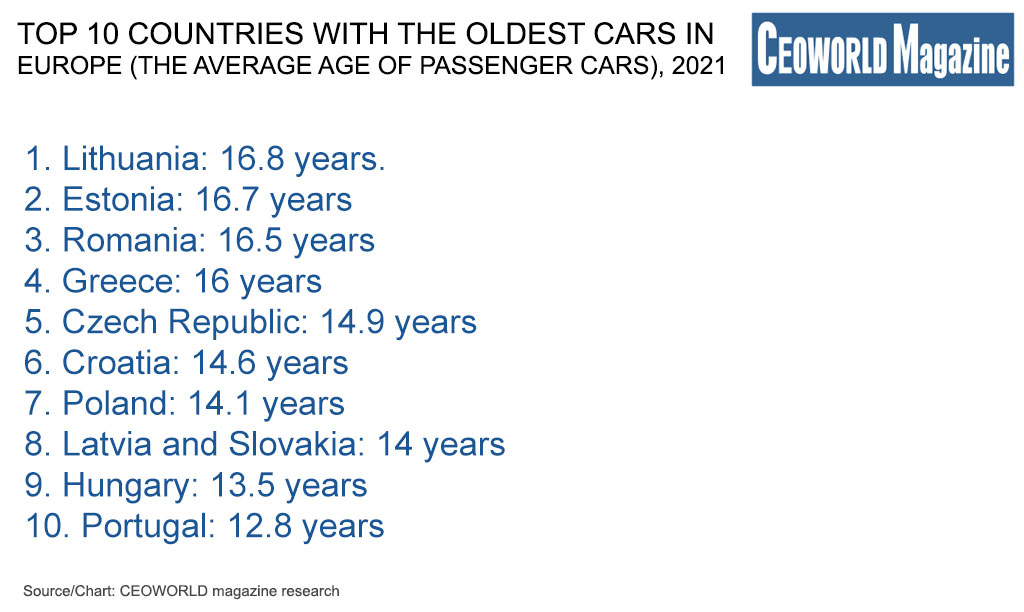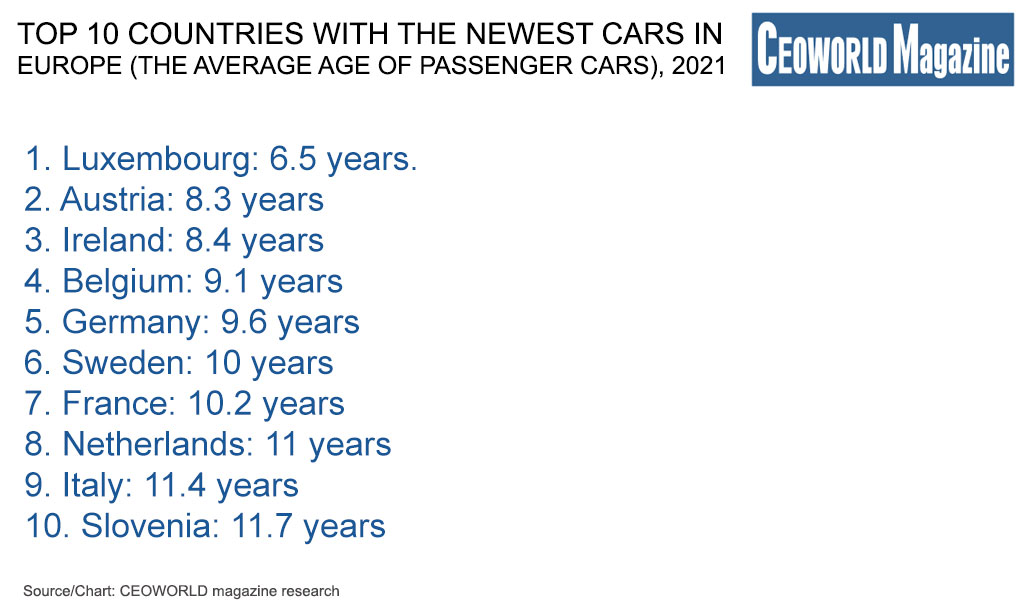Which European countries have the oldest and newest cars (the average age of passenger cars), 2021

Lithuania, Estonia, and Romania complete the top 3 countries with the oldest cars in Europe. According to data from the European Automobile Manufacturers Association that were published in January 2021, Lithuania has the oldest fleet since the vehicles are older than 16 years. More specifically, the average age of passenger cars is 16.8 years. Next comes Estonia where the average age of passenger cars is 16.7 years. The third country on the list is Romania. There the average age of passenger cars is 16.5 years.
This trend characterizes some more European countries, according to recent data. Greece took 4th place on the list. The average age of passenger cars in Greece is 16 years. Closely follows the Czech Republic where the average age of passenger cars is 14.9 years. Croatia has also one of the oldest fleets in Europe and for this reason, comes 6th on the list. In Croatia, the average age of passenger cars is 14.6 years. Poland took 7th place on the list since the average age of passenger cars is 14.1 years. Τhe 8th place of the list is shared by two countries. Latvia and Slovakia where the average age of passenger cars is 14 years. Hungary holds 9th place on the list. There the average age of passenger cars is 13.5 years. Portugal completes the top 10 list of European countries with the oldest cars. There the average age of passenger cars is 12.8 years.
- Lithuania: 16.8 years.
- Estonia: 16.7 years
- Romania: 16.5 years
- Greece: 16 years
- Czech Republic: 14.9 years
- Croatia: 14.6 years
- Poland: 14.1 years
- Latvia and Slovakia: 14 years
- Hungary: 13.5 years
- Portugal: 12.8 years
On the opposite, are several countries with newly obtained fleets. Someone can find the newest cars in Luxembourg. According to recent data from the European Automobile Manufacturers Association the average age of passenger cars in Luxembourg is 6.5 years. Second in the list of the European countries with the newest cars comes Austria, where the average age of passenger cars is 8.3 years. Ireland completes the top 3 countries since the average age of passenger cars in the country is 8.4 years. Belgium holds 4th place on the list with the average age of the passenger cars to have been counted in 9.1 years. Closely follows Germany. There the average age of the passenger cars is 9.6 years. Sweden took 6th place on the list since the average age of the passenger cars is 10 years. At number seven on the list comes France where the average age of the passenger cars is 10.2 years. Netherlands, Italy, and Slovenia hold the 8th, 9th, and 10th place on the list respectively. In the Netherlands, the average age of passenger cars is 11 years, in Italy 11.4 years and in Slovenia 11.7 years.
- Luxembourg: 6.5 years.
- Austria: 8.3 years
- Ireland: 8.4 years
- Belgium: 9.1 years
- Germany: 9.6 years
- Sweden: 10 years
- France: 10.2 years
- Netherlands: 11 years
- Italy: 11.4 years
- Slovenia: 11.7 years
The European Union counts 569 cars per 1.000 inhabitants. Luxembourg has the highest car density in the EU (694 per 1.000 people) and Latvia the lowest (342 per 1.000 people). Also, Romania has one of the lowest car densities in the EU (355 per 1.000 people). Croatia completes the top 3 countries with the lowest car densities in the EU (424 per 1.000 people). Except from Luxembourg, Italy and Poland have also high car density rates in the EU. In Italy there are 655 passenger cars per 1.000 inhabitants while in Poland there are 642 passenger cars per 1.000 inhabitants.
It is worth mentioning that in Hungary and Latvia half of all households do not own a car, while more than 31% of French families have two cars. Households with three cars or more are not so common in the EU. For example, both in Austria and Latvia, 6% of the households own three cars or more. At the same time in Belgium, 5,7% of the households own three cars or more.
Bring the best of the CEOWORLD magazine's global journalism to audiences in the United States and around the world. - Add CEOWORLD magazine to your Google News feed.
Follow CEOWORLD magazine headlines on: Google News, LinkedIn, Twitter, and Facebook.
Copyright 2025 The CEOWORLD magazine. All rights reserved. This material (and any extract from it) must not be copied, redistributed or placed on any website, without CEOWORLD magazine' prior written consent. For media queries, please contact: info@ceoworld.biz










